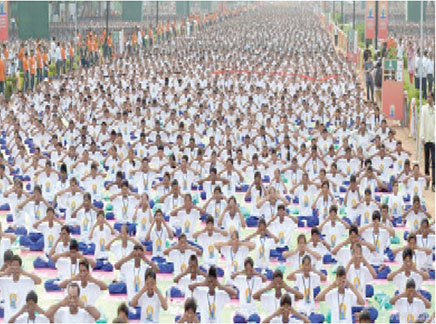Not so long ago India was sold as a mystical land of ash-smeared holy men, snake charmers and other cultural exotica, all part of the nation’s collective imagery.
The scale of the challenge
India ranks 142, out of 189 countries, for ease of doing business, according to a World Bank 2015 ranking.
China, India’s next-door neighbour and closest competitor, ranks 90, while Canada (16), US (7), UK (8) and Australia (10) were considerably more business friendly.
Source: The World Bank
But today’s India is a far cry from the stereotypes.
After the United States and China, it’s the world’s third largest economy. India’s meteoric rise has been fuelled by a remarkable shift in its economic fortunes.
During a period when growth remained anaemic across much of the industrialised world, India’s Gross Domestic Product (GDP) grew a staggering 7.2 per cent in 2014 under Prime Minister Narendra Modi’s reform-focused government.
Aside from recent stock market jitters, the World Bank pegged India’s GDP growth at 7.5 per cent for 2015.
Much of India’s economy is driven by its so-called “demographic dividend”: Nearly two-thirds of India’s 1.2 billion population is under the age of 35, creating one of the largest consumer markets in the world.
It’s no surprise it’s attracting businesses the world over, keen to access these new customers.
“India provides a good balance between a fast-growing economy and one that happens to be relatively open and transparent,” said Dhruv Ratra, San Francisco-based Chief Executive Officer of Anglian Omega Network, an umbrella group headquartered in Dubai, United Arab Emirates, whose business ventures in India include everything from beauty product businesses to commodities and manufacturing.
“With China slowing and providing multiple barriers to entry, and Europe stagnating, there are very few places in the world that provide the opportunities that India does.”
Behemoths like Amazon, Starbucks, Uber, Foxconn, and even the United States Republican Party presidential candidate, Donald Trump, have expanded their businesses to India, “thereby justifying our views and decisions when we started operations in the country,” Ratra added.
There’s no doubt there are many rich investment opportunities in India, but they’re scattered over an obstacle course of opaque rules and regulations.
Business people who have found their way through say it takes a lot more than deep reserves of patience to navigate.
The greasing of palms
India has long struggled with endemic corruption and it’s still a problem.
Overt or implied demands ranging from small kickbacks, called “baksheesh,” to large corporate “donations” – common ways to grease the wheels of business fortunes in India – can quickly frustrate foreigners.
India still ranks 85 among 175 countries on Transparency International’s Corruption Perception Index.
Corruption or graft is a reality foreign entrepreneurs must accept, but not give into, said Melbourne, Australia-based Stephen Manallack, director at East West Academy Pty Ltd, a cross-border trade and investment advisory service that specialises in doing business in India.
“The issue of corruption has been the elephant in the room for too long and most people are reluctant to discuss it,” said Manallack, author of Riding the Elephant – Doing Business in India.
Dutch national Paul Schuttenbelt, who runs Youth Football International, a football training academy, and the Delhi Youth League, said people won’t ask for pay-offs, but that means that sometimes things just don’t move forward.
“Clearly a lot of middle-men and grounds staff don’t work if you don’t pay them, or give them something.”
A mountain of paperwork
Foreigners who want to set up businesses in India “must remember that paperwork and processing times are still a little tedious even for Indians familiar with the system,” Ratra said.
It takes an average of 30 days just to get a business officially registered, too slow for entrepreneurs used to speedy processing in Canada (five days) or Australia (2.5 days).
British expatriate Vikas Vij experienced this first-hand setting up his event management business, The Ideas Exchange, in Mumbai.
“The process for registering a business, becoming service-tax registered, installing telecoms and internet systems is not as simple as we take for granted in the UK,” said Vij, in India since 2008.
The flow of foreign direct investment (FDI) in India has long been hindered by a complex system of inscrutable regulations.
Canadian businessman Suneet Singh Tuli believes there is a lot more that could be done and wants the Modi government to deliver faster on its pro-business promises.
The government should address anomalies of duties to boost manufacturing activity, suggested Tuli, president and CEO of Data Wind, a Canadian tech firm specialising in low-cost digital devices such as tablets and smartphones, which has operations in India.
“Greater transparency, good e-governance and stringent graft [corruption] laws could lead to quicker policy decision in procurements.”
A patchwork of tax laws
Few things have dented India’s appeal for foreign business people more than its arduous tax laws.
Critics argue that in addition to being out of sync with the global norm, they’re draconian and, in some cases, amount to tax terrorism.
India’s highly publicised battles with local subsidiaries of foreign businesses – Vodafone, Nokia, and more recently Nestle, for instance – have drawn media attention and global scrutiny.
“Anomalies in duty structure in relation to import of finished products versus components is a major drawback,” Tuli said, explaining that a patchwork of tax laws across states can soon overwhelm entrepreneurs used to a more uniform set of regulations back home.
Building relationships
Cultural misunderstanding plays a role in almost every case of cross-border business failure, according to Manallack, who places it at the top of his list of challenges.
“Many Western business people are not curious about Indian culture,” he said.
“Because Indians are so polite and courteous, the Westerner thinks that the Indian has adapted to them, but then nothing happens and they wonder why.”
As a society, India is very relationship focused. To complicate matters, it’s many countries within a country.
“India is a collage of extremely diverse groups of people identified by their history, language, religion, caste, and education,” said Ratra.
“This is a complicated issue for most outsiders to wrap their heads around.”
While setting up his football academy in India, Schuttenbelt experienced cultural hurdles that frequently foiled what seemed like the perfect setup for scoring a deal.
“I would reach agreements with the top people of the company, after several meetings, and would walk away thinking I had the deal,” he said. “Eventually, they’d result in nothing.”
Be prepared for transport problems
There has been a surge in bids to improve the country’s creaky infrastructure. Most of the recent infrastructural overhaul has been limited to a handful of big cities – Mumbai, Delhi, Chennai, Kolkata, Bengaluru and Hyderabad.
Compared to rival China, there’s plenty of room for infrastructure growth in India, said Tuli who operates businesses in both countries.
India has only 1,300 kilometres of fast roads compared to 77,000km in the U.S., and 112,000km in China.
India doesn’t have any high-speed trains, most averaging under 100km/hour, whereas China has the world’s largest high-speed rail network.
Water shortage and power outages are common occurrences and many of the country’s ports still rely on manual labour to move cargo.
Hiring smart
There is a huge gap in the market for skilled professionals. While India has around 487 million workers, more than two-thirds of Indian employers are struggling to find employable workers.
“From my own experience, the fundamental challenge we all face, contrary to popular international opinion, is the difficulty in sourcing the right talent and skill sets to run and scale up a business,” said Vij.
“Each year more jobs still go unfilled because the quality of talent does not match.”
The current shortage of employable workers in India is attributed to the fact that only 2.3 per cent of the workforce has received formal skills training as compared to 68 per cent in the UK, 75 per cent in Germany, and 52 per cent in the U.S.
Sticking it out
For most of the first five years of doing business in India, Vij often thought of giving in and going back to the UK, but decided to stick it out for the opportunity and better work-life balance.
The decision paid off: “Our trade exhibition, Professional Beauty, became the market leader in the region despite many hurdles and battles,” he said.
“This reinforced my thoughts on the value of perseverance in adversity to the extent that we now run that event in four cities around India, and in 2016 will take it to Sri Lanka.”
The key to business survival in India, Vij added, has been a strong streak of stubbornness, an unwillingness to be beaten by anyone or any system.
“India has … given me the experience to be successful anywhere in the world,” he said.
• Culled from www.bbc.com/capital
- Advertisement -
- Advertisement -











